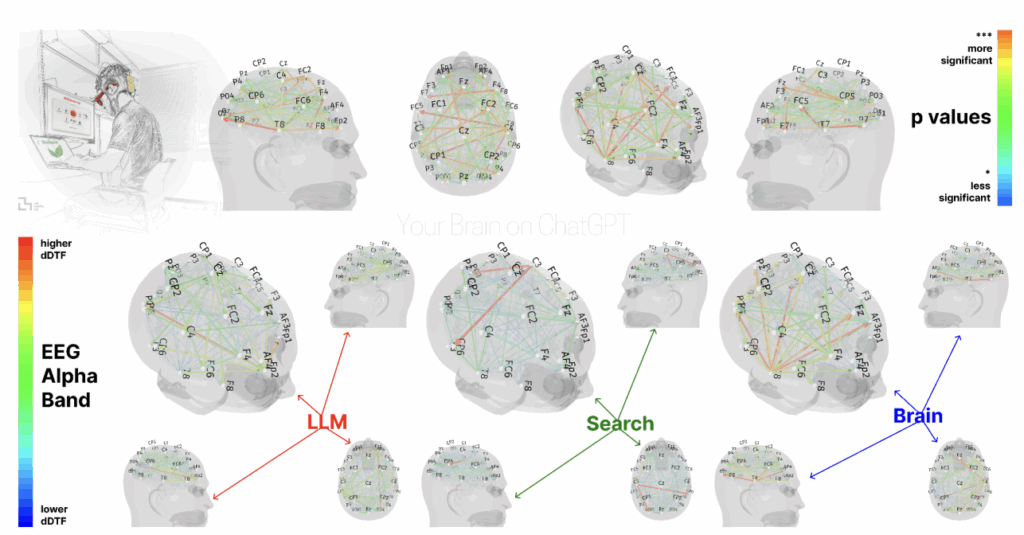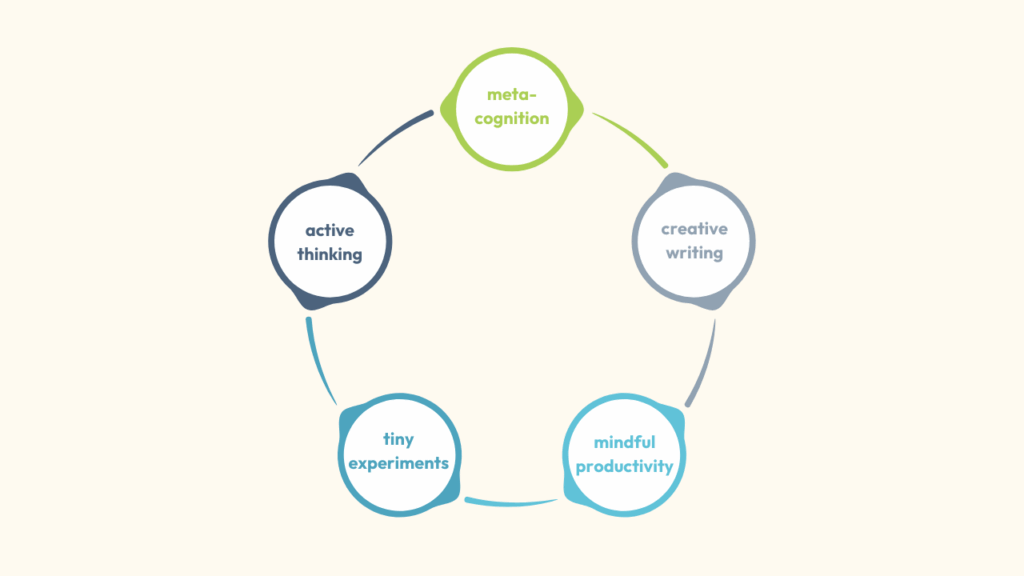Generative AI has become part of everyday life for millions of people. We use it to polish emails, brainstorm ideas, write essays, and even as a coach or therapist. But as we hand over more of our thinking to AI, some have begun to wonder whether we’re paying a hidden price.
A recent study from MIT has fueled this debate, with headlines wondering whether ChatGPT may rot your brain. People are worried this technology is eroding critical thinking. Others say these claims are just scaremongering.
What does the science actually say? As a neuroscientist, I might be able to help break it down. Let’s take a closer look at what this study found (and what it didn’t).

Inside the study
Over the course of several months, researchers at MIT asked 54 students to write a series of essays. Participants were divided into three groups:
- LLM group: using ChatGPT for assistance
- Search Engine group: using Google without any AI help
- Brain-only group: writing without any tools
Each participant completed three essays in their assigned condition. In a fourth session, some people switched methods (for example, ChatGPT users then wrote without AI, and vice versa).
As they wrote, the researchers monitored brain activity using EEG headsets. They also tested participants’ memory of their essays, scored the essays for quality (using human teachers and an AI model), and asked participants how much the essays felt like their own work.
Here’s what they found:
- Brain activity: The Brain-only group showed the strongest and most widespread brain connectivity, particularly in alpha and beta frequency bands associated with attention and memory. The Search Engine group showed moderate engagement, while the LLM group showed the weakest brain connectivity.
- Memory recall: After each session, participants were asked to quote a sentence from their essay. 89% of people in the Brain-only group gave accurate quotes versus 83% in the Search group. Now, the part that shocks a lot of people: 0% in the LLM group managed to give an accurate quote.
- Sense of ownership: Most Brain-only writers reported that their essays felt entirely theirs, and none of the Search group participants reported feeling no ownership of their work. ChatGPT users were more likely to say they felt little or no ownership over their work.
- Essay content: NLP analysis showed that ChatGPT-assisted essays often relied on similar phrasing and examples. But that wasn’t the only issue: human teachers described many of these essays as repetitive and lacking originality. Some even called them “soulless.”
Based on these findings, the researchers argued that over-reliance on AI tools could lead to “cognitive debt”—a kind of mental shortfall where people don’t engage deeply enough to learn or remember.
It’s an interesting study, but there are important caveats to keep in mind.
The authors themselves highlight several limitations. The study had a small sample size of just 54 participants, nearly all from elite universities, making it hard to generalize to broader populations.
Participants wrote short essays under tight time limits (20 minutes each), which doesn’t reflect how people use AI in everyday life. The research also looked only at short-term effects, not whether long-term AI use would change brain function. And in the final “switching” session, only 18 participants took part, making those results especially tentative.
There are also additional limitations worth noting.
In reality, people tend to use AI more flexibly than the rigid instructions given to the LLM group who were told to rely exclusively on AI.
The task itself (writing SAT-style essays) may not represent other types of thinking or learning where AI might be used differently, such as coding or creative brainstorming.
This doesn’t mean the findings aren’t valuable! But they reflect a very specific setup and can’t really be taken as proof that AI is inherently harmful to our brains.
Keeping your brain in the loop
So what can we actually take from this study? While the findings don’t prove that ChatGPT will harm your brain, they’re a useful reminder to use AI tools thoughtfully. Here are five practical tips:

- Stay actively involved. Don’t let AI do all the thinking. Use it to support your process such as brainstorming ideas and rephrasing sentences, but make sure you’re still wrestling with the core concepts yourself. That sense of effort is a signal you’re learning.
- Use AI to challenge your thinking, not replace it. Ask AI to poke holes in your arguments or suggest counterpoints, rather than just generating answers. Ask generative questions like: “What am I missing?” or “Do you notice any illogical statement here?”
- Write first, refine later. If you care about a topic, take the time to draft your own ideas before asking AI to edit or polish them. This will increase your sense of ownership and understanding of the topic so you’re actually able to articulate those ideas in conversations.
- Be mindful of over-reliance. The more you lean on AI to handle entire tasks, the less you may remember how to do them yourself. Which is fine for some tasks, but be intentional if there’s something you’d like to keep on being able to do yourself—this is a form of mindful productivity.
- Experiment to find your sweet spot. Try different ways of using AI for co-writing, brainstorming, or editing, and actively reflect on which approaches leave you feeling not just more productive but also more creative, and which feel like outsourcing your thinking in the name of efficiency. This kind of metacognitive practice can be part of your weekly review.
The MIT study offers a fascinating glimpse into how our brains respond to AI assistance. But it also had narrow, artificial parameters. Writing essays in 20 minutes with an EEG headset on in a lab is not the same as using AI in your day-to-day life.
The real question isn’t whether you should use AI, but how you use it. Like any tool, it can either sharpen or dull your skills depending on your approach. Keep your brain in the loop, and AI can be a powerful partner instead of a crutch.
